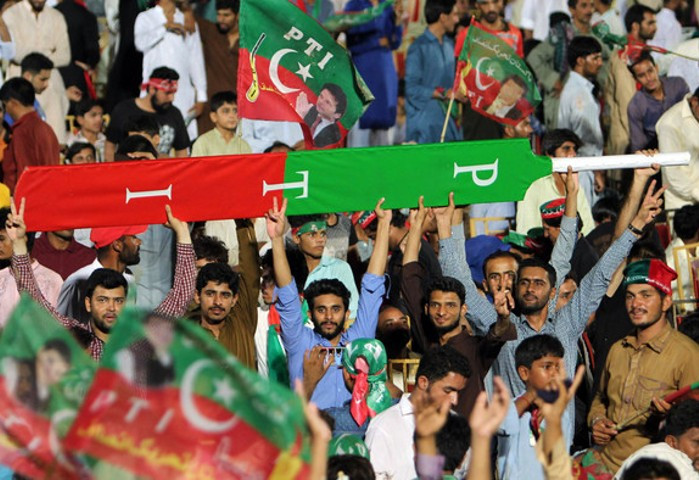
As the Pakistan Tehreek-e-Insaf (PTI) flashes mixed signals with its conflicting statements, one thing remains crystal clear: the former ruling party, following in the footsteps of its predecessors, is desperate to talk to the powerful stakeholders to reclaim its once-cherished political territory.
Despite facing barbs and jibes suggesting that PTI was merely angling for a backdoor deal or a convenient NRO, political pundits suspect a deeper game is afoot. The frantic appeals from certain PTI leaders to engage with the army chief and the spymaster stem from a belief that no one else holds the keys to PTI's salvation but these powerful stakeholders.
Renowned political expert, Zaigham Khan, said that PTI has always wanted to talk to the establishment but its approach has remained different.
From the time when Imran Khan was ousted, the political expert noted, PTI tried to engage by putting pressure on the establishment, military leadership and the judiciary. The purpose was that the powerful quarters should engage Imran Khan on his terms, Zaigham said, recalling that the military was the addressee of the party’s protests and rallies and its demands were also directed at the establishment only.
“The essence of it was that I am right and the others are wrong and you are morally bound to support me than these [other parties] people,” Zaigham said, “essentially, it’s a way of dialogue but he [Imran] went way ahead in his method of putting pressure and it had severe repercussions.”
Read more: Imran gives PTI go-ahead for talks
Right now, Imran definitely wants to talk to the establishment and that’s what has been conveyed to the party leaders. His other consistent position is that PTI will not talk to other political parties, he said, saying it has been consistent with his past narrative.
Zaigham said that Imran also knows that other political parties can’t deliver what he has been demanding. Frankly, he added, the other political parties wouldn’t even want to give a lending hand to him right now as PML-N is happy to see him behind bars because it is “very unpopular” and if space is given and PTI returns, it would be a bad news for PML-N.
“The game between PTI and PML-N is at a stage where the winner takes all,” Zaigham said, adding that PML-N knows either they or PTI will survive. “In this situation”, he added, “PTI wants to talk to the military.” Though PTI still wants to exert pressure, he said that it has reviewed its strategy a bit, especially, after reentering in the democratic process, taking government in a province, becoming a part of the National Assembly, and taking PAC and other committees’ chairmanships.
According to Zaigham, initiating dialogue is the optimal path forward. However, PTI's preference lies in engaging solely with the establishment, dismissing broader dialogues such as the charter of democracy advocated by PML-N and PPP. PTI contends that the timing for such expansive discussions is not opportune, particularly with Imran Khan incarcerated and in a precarious position.
But, he incorporated that Imran wouldn’t prefer dialogue over his narrative if he came out.
Suggesting a way forward, he said, the situation should be diffused; PTI should get its democratic rights and other parties, despite having reservations about Imran’s populist or authoritarian style of politics or his being acting as a demagogue, should deal with him through democratic means and providing themselves as democratic alternatives, in which they are failing.
“That’s something they need to correct,” he concluded.
Also read: PTI denies receiving invitation for reconciliation talks
Another renowned political analyst, Majid Nizami, said that an important phase of parliamentary democracy in the shape of elections has just concluded and parliament as well as cabinet is functional; the country has a new head of state; and since things can’t naturally remain in an intensified position forever; they are needed to be normalised.
If we look at the timeline of the 2018 elections, the expert said, it is evident that things were extremely difficult for PML-N supremo Nawaz Sharif before the elections but, after the elections, they started to ease out within a few months. “Definitely,” Nizami said, “PTI and establishment both want to tackle the situation now and CBMs – confidence-building measures – should be started so that no further instability comes in.”
Ruling out the factor that Imran’s prolonged incarceration triggered the recent debate about PTI-establishment talks, Nizami said that the political history of the past two three decades shows that no big political movement took place right after the elections which led to the ouster of the newly-elected government.
“That is why people in PTI and establishment’s quarters want to normalise things now,” Nizami said, adding that PTI will definitely talk to the establishment as it has never been an anti-establishment party and its differences were only with some personalities of the establishment.
“They [PTI] never ignored the role of the establishment; in fact, they support it,” Nizami said. Therefore, he added, “If PTI engages in talks with the establishment then it is definitely ready to strike a deal or get an NRO; whatever you name it.”
Frankly, he said, given the authority and control that the powerful quarters exercise, they won’t feel the need to respond to PTI’s frantic calls for talks. However, he incorporated, that people close to the establishment want de-escalation and one sign of it was the recent relief that PTI leaders got from courts when they came out of hiding after the elections. “Things are going towards the normalisation phase after the elections,” he reiterated.
Suggesting a way out of coming out of the current political turmoil, Nizami said that political parties should strengthen themselves and sit across the table.
“Instead of talking to the then PTI government, PML-N had also talked to the establishment before PDM came to power,” Nizami recalled, “PTI also wants to do the same; it wishes to talk to powerful quarters instead of talking to PML-N and PPP.”
To end the process of going in circles, he concluded, that political parties should sit together instead of looking towards establishment or GHQ.
1724760612-0/Untitled-design-(12)1724760612-0-405x300.webp)





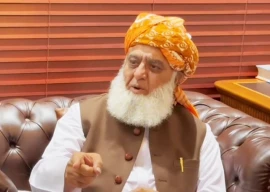


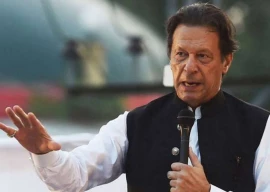



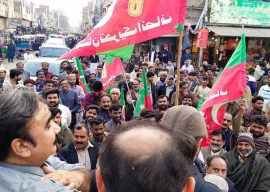
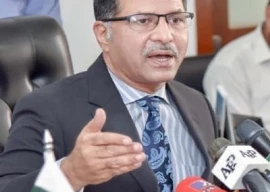






COMMENTS
Comments are moderated and generally will be posted if they are on-topic and not abusive.
For more information, please see our Comments FAQ